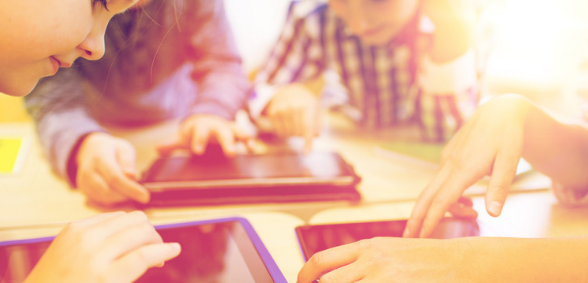
Sir Anthony Seldon of the University of Buckingham claims that, within the next 10 years, artificial intelligence (AI) will cause a shift in how we teach students. Here we look at the importance of technology in education, and the changes it may bring
It was a common conversation that technology would eventually take over our lives — and developments in the sector don’t seem to be slowing down. With its constant advancements and changes, we’re now living in this reality.
Education establishments aren’t shy of adopting these changes either — gone are the days of text book research. Over the years many improvements have been made to the way we teach through the introduction of different technologies. So, how has technology improved the classroom experience and what the education system could look like in the future?
The role technology plays
We’re currently living in a world that has a focus on digital alternatives. Universities, colleges, secondary schools, primary schools and even nurseries have adopted technology in their classrooms to deliver a better learning experience for all; not only does this provide young people with a better education, it also gives them the preparation they need for what has now become a tech-savvy working world.
Believe it or not, a study carried out by Barbie Clarke found that 68% of primary schools and 69% of secondary schools across Britain currently use tablets – nine per cent of these schools said that there was a tablet device for every pupil studying at their establishment.
However, schools that did not have tablets in circulation said they were considering doing so in the future (45%). Taking a look back to 2014, it was reported that there were 430,000 tablets in education establishments and this figure was expected to rise to over 900,000 by 2016; however, no confirmation result has been released.
How is this technology being used?
Tablets and other gadgets are making lessons more interactive regardless of the subject, encouraging more pupil participation. It can also improve the retention rate of learners by catering to different types of learners; pupils are more likely to retain this kind of information over a teacher simply reading from a textbook.
Learning is all about personalisation, as everyone progresses at a different rate, and tablets can be used to help teachers teach through games, music, e-books and more! Another benefit is that teachers now have the ability to search for materials they need online, allowing them to access additional resources where required.
Online lessons are also becoming more popular. Teachers can connect with a group of students remotely. This is most prominent in university and colleges, although it can also be used for younger children to teach them a specific subject or module. Exams can also be taken online – showing a huge shift in the traditional methods.
What does the future look like?
According to Sir Anthony Seldon of the University of Buckingham, artificial intelligence will have a greater presence in our schools over the next decade. Although teachers will still be there in the classroom, Sir Anthony believes they will act as assistants to the AI device which will actually teach the lesson. Essentially, teachers will control classroom behaviour rather than actually teach.
“It will open up the possibility of an Eton or Wellington education for all,” Sir Anthony Seldon commented. It is thought that AI devices will be able to determine how quickly a student is learning and assist them in the best ways possible to ensure a truly personalised experience, working at the pace of the students and setting tasks accordingly.
Don’t forget to follow us on Twitter and keep up-to-date with the latest news and features
